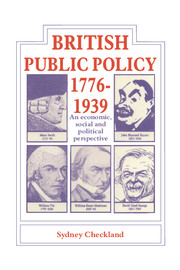Book contents
- Frontmatter
- Contents
- Preface
- Introduction
- Part I Industrialisation and war, 1776–1815
- Part II Assimilating the industrial revolution, 1815–51
- Part III The Victorian apogee, 1851–74
- Part IV Industrial maturity and the ending of pre-eminence, 1874–1914
- 9 The continued freedom of the market mechanism; the state-induced changes in its operating conditions
- 10 Land and rule in England, Wales, Scotland and Ireland
- 11 The emergence of a public sector, chiefly at the local government level
- 12 The assertion of the power of labour in industry and politics
- 13 Welfare and the social democratic urge
- Part V Total war and troubled peace, 1914–39
- Bibliography
- Index
11 - The emergence of a public sector, chiefly at the local government level
Published online by Cambridge University Press: 05 August 2012
- Frontmatter
- Contents
- Preface
- Introduction
- Part I Industrialisation and war, 1776–1815
- Part II Assimilating the industrial revolution, 1815–51
- Part III The Victorian apogee, 1851–74
- Part IV Industrial maturity and the ending of pre-eminence, 1874–1914
- 9 The continued freedom of the market mechanism; the state-induced changes in its operating conditions
- 10 Land and rule in England, Wales, Scotland and Ireland
- 11 The emergence of a public sector, chiefly at the local government level
- 12 The assertion of the power of labour in industry and politics
- 13 Welfare and the social democratic urge
- Part V Total war and troubled peace, 1914–39
- Bibliography
- Index
Summary
The state and the public sector
The central government continued to own and manage the Post Office and the telegraphs, together with the naval dockyards and the arsenals; from 1912 the Post Office acquired an effective monopoly of the telephone system. There were two additions to the business role of government, both of them involved in foreign policy. One was the acquisition by Disraeli in 1875 of shares in the Suez Canal Company sufficient to control it, giving Britain mastery of this great link to India and the Far East. Secondly, the British government was from 1911 in search of an oil policy, involving it deeply in the politics of Turkey and the Middle East.
Oil had become a vital concern for Britain's Admiralty because of the need to have a secure supply for the navy. Winston Churchill (1874–1965) became First Lord of the Admiralty in 1911; he committed the navy to conversion to the new kind of oil-burning marine engines. Mesopotamia and Persia offered the best prospects for an oil supply. In 1914 the British government, after much complex negotiation by the Foreign Office, acquired a majority shareholding in the Anglo-Persian Oil Company.
Oil indeed in a sense epitomised the new struggle for world resources that was to characterise the new century, drawing British governments into extensions of their diplomacy and informal empire and bringing the state and business into a new close (though often covert) collaboration.
- Type
- Chapter
- Information
- British and Public Policy 1776–1939An Economic, Social and Political Perspective, pp. 196 - 203Publisher: Cambridge University PressPrint publication year: 1983



